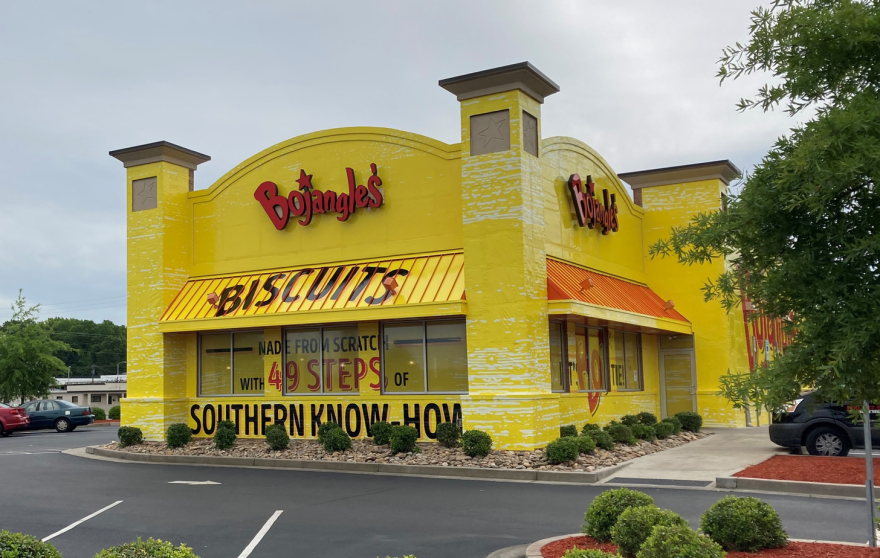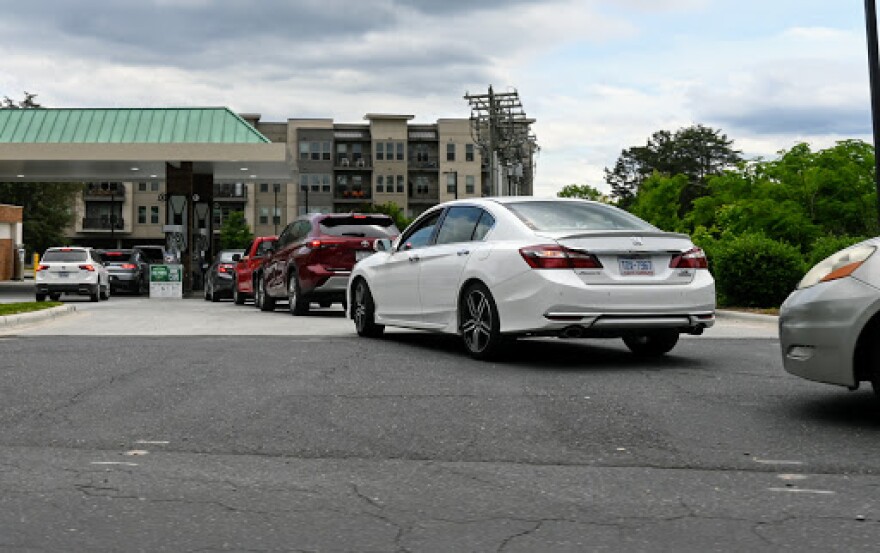There have been long lines at gas stations in the Charlotte area this week as drivers flock to fill up following a cyberattack on Colonial Pipeline. The pipeline announced late Wednesday it has restarted operations but says it could be several days before supply returns to normal at the pump.
AAA Carolinas says panic buying among drivers is leading to a shortage of gas — as well as higher prices. It's created a headache for drivers, but what about businesses? We turn to Tony Mecia of the Charlotte Ledger Business Newsletter for our segment BizWorthy.
Marshall Terry: So, Tony, what is the effect of all this on area businesses?
Tony Mecia: Well, Marshall, I think it's a lot of the same effect that we're all feeling individually as people who drive cars. I mean, I think a lot of businesses, they're trying to make plans: How do they get the fuel they need to make deliveries, that sort of thing. We're not quite at a point yet where people are out of gas. But, you know, this isn't just a phenomenon that's affecting drivers or commuters.
American Airlines said this week, for example, it's added a few stopovers on long-haul flights from Charlotte — one to Honolulu and one to London. Those that used to be nonstops are now going to stop off and refuel in other parts of the country. So I think a lot of businesses are taking a look at it, watching and communicating with their customers. But, yeah, it's certainly something that a lot of businesses are paying some close attention to. A lot of it's going to depend on how long this whole thing drags out.
Terry: We've talked a few times during this segment about Charlotte companies' plans to bring workers back to the office. You recently spoke with employment attorneys and human resources advisers, among others, to get their take on the return to the office. What did they have to say?

Mecia: Well, they said a number of different things. I think employers are looking at how to bring those employees back and when to bring those employees back. When it's safe, how they communicate that, what the logistics are going to be. I mean, it seems as though most companies are saying that it's not going to be 100% of people in 100% of the time. It's going to be more of a sort of hybrid schedules.
There are a lot of questions that employment lawyers and human resources people are receiving about vaccinations. Can employers require their workers to be vaccinated? The answer is usually yes, but a lot of them are still not requiring that. There are some legal issues related to that. So it's really sort of all under the umbrella of how do you bring all these workers back? How do you do it safely? How do you do it legally?
Terry: A lot of people have gotten used to working at home. In fact, a lot of them like working at home. So what if people just don't want to go back to the office? What then?
Mecia: Well, that's a really good question. And that's something that employers are dealing with a lot. Some people really are eager to get back into the office. Others are fine staying home and doing Zoom calls in their pajamas and eating lunch out of the fridge. So really, it's one of these things where employers, they're sort of grappling with this question of can they force workers to come back into the office? They usually can, but some of them might not want to if those workers have other options for other jobs.
Terry: You report this week, Mecklenburg County has purchased 100 acres for an addition to Reedy Creek Nature Preserve. What are the plans for that land?
Mecia: So this is land that's sort of between east Charlotte and University City off of Harris Boulevard. Right now, it's about 1,000 acres between the park and Nature Preserve. The county is adding another 100 acres to that, and it's mostly going to stay as forest. They are going to use some of it. It's going to help with a greenway that's being built in there. A spokesman for the county told me they might put in a few picnic tables, but it's not like they're building parking or ballfields or anything like that.
So, you know, in a town where a lot of people often worry about "are we cutting down too many trees and building too many apartment complexes," this is a fairly large land purchase by the county to preserve some of these trees.

Terry: Finally, Tony, you report that a certain Bojangles location in Charlotte has gotten in trouble with code enforcement. What for?
Mecia: If you've driven down Independence lately, right at Idlewild Road, there is a bright, yellow Bojangles that's been wrapped in vinyl. Bojangles says it's supposed to resemble a "Bobox," which is one of their boxes of chicken. And the city says that that is in conflict with the city's sign ordinance — that you cannot vinyl-wrap an entire building. So code enforcement is working with Bojangles. Bojangles says they did not realize that that was an issue and that they are working with the city to remove that.
Terry: All right, Tony, that's all we have time for this week. Thank you.
Mecia: Thanks, Marshall.






